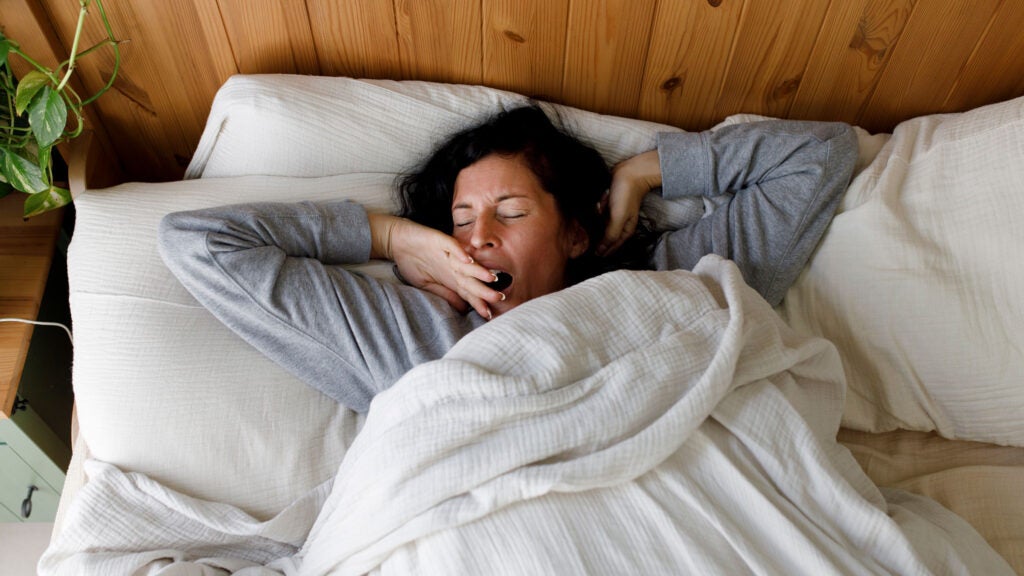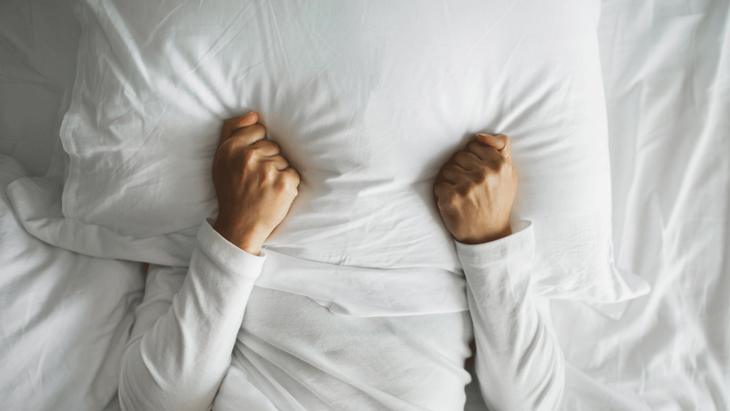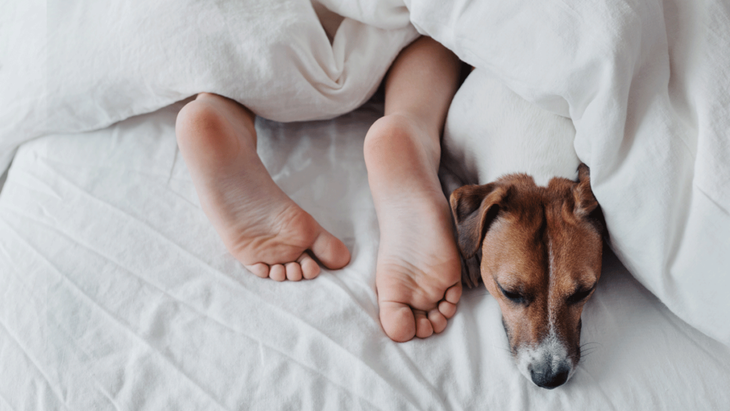
Even supposing recommendation on find out how to sleep higher is in all places, it’s turning into an increasing number of difficult—to not point out irritating—to seek out dependable data.
Social media, exaggerated product claims by manufacturers, even medical doctors who lack schooling can perpetuate myths round sleep, says Pedram Navab, a health care provider of osteopathic drugs, neurologist, sleep drugs specialist, and writer of Sleep Reimagined: The Quick Monitor to a Revitalized Life.
The choice to falling for false assertions is familiarizing your self with recommendation from consultants who perceive the science of sleep. The next insights will assist make sure you don’t lose one other night time’s relaxation.
8 Sleep Myths (and the Science That Debunks Them)
1. You Shouldn’t Train Earlier than You Go to Mattress
Analysis has lengthy supported the truth that train can enhance your sleep high quality. Though a single exercise can deliver constructive outcomes, the extra recurrently you’re employed out, the extra probably you’re to sleep higher.
Till just lately, consultants cautioned towards exercising near whenever you flip in for the night time. Not anymore. “For most individuals, exercising at night time gained’t get in the best way of sleep,” says Michael Grandner, PhD, affiliate professor of psychiatry on the College of Arizona School of Drugs and lead scientific advisor to Sleep Reset, a customized sleep program.
Proof lies in a 2019 assessment of sleep research that concluded night train didn’t adversely have an effect on high quality of sleep in topics. Actually, it appears to have improved it. The one exception had been those that practiced high-intensity train, similar to working or biking, inside an hour of attempting to go to sleep. Many of those topics reported experiencing problem falling asleep and poorer high quality sleep.
Should you’re a late-night exerciser and suspect train is messing together with your relaxation, attempt understanding earlier or reducing the depth of your nighttime routine. You may even attempt restorative yoga or Yoga Nidra, or a hybrid yoga class that begins with a fast-paced sequence and slowly settles into long-held stretches often called Yin Yoga.
2. It’s Solely What You Do At Night time That Issues
Sure, everybody is aware of that consuming caffeine and taking lengthy naps can stifle sleepiness hours after the actual fact. However there are much less apparent daytime behaviors that may affect your means to go to sleep. Notably, stress. Scientific analysis has proven us repeatedly that stress and sleep interact in an advanced relationship.
“We predict ‘I’m going to be up all day working after which I’m going to show my life off,” says Shelby Harris, PsyD, a behavioral sleep drugs supplier and sleep knowledgeable with Calm, the sleep and meditation app and psychological well being model. “However as sleep informs the day, the day informs sleep.” Harris suggests that you just consider sleep on a 24-hour continuum as a reminder to “take note of all of the methods you handle your bodily and emotional well being all through the day, which in flip influences your means to sleep.”
She suggests getting outdoors to make sure enough publicity to pure gentle, which may reset your circadian rhythm. Additionally, Harris says, taking mind breaks as wanted or no matter else helps you be at a greater baseline. One factor she recurrently recommends is meditation.
“Once you meditate throughout the day, you domesticate a lifetime of mindfulness and spot when your mind is speaking a lot, and also you be taught to deliver it again,” says Harris. “It makes it simpler for them to make use of meditation at night time when the stakes appear larger. You may say, ‘Nope, not now, again on observe.’”

3. Mendacity in Mattress With Your Eyes Closed Counts
Technically, sure, mendacity in mattress awake together with your eyes closed constitutes relaxation. But it surely’s no substitute for sleep. Satirically, that well-intentioned habits may really set you up for continued sleep disruption.
Based on Grandner, remaining in mattress when you may’t sleep is the most typical habits that may flip short-term sleep points into long-term insomnia. “You’re making a wake affiliation with the mattress,” says Grandner. This implies your physique and thoughts get used to not sleeping in mattress, which may make falling asleep extra traumatic and hold you awake.
Should you’ve been mendacity awake for greater than 20 minutes or are getting pissed off, get away from bed and do one thing stress-free, says Grandner. As an illustration, meditate or learn a non-stimulating ebook in a dimly lit room. As quickly as you begin feeling drained, head again to mattress. Resist the urge to take a look at any digital machine when you’re up. The machine may stimulate your thoughts an excessive amount of to fall again asleep and the blue gentle may mess up your manufacturing of melatonin, a sleep-inducing hormone, in line with the Sleep Basis.
4. You Want 8 Hours of Sleep
For years, we had been informed that we wanted eight hours of sleep. Whereas it’s potential eight hours is what you want, not everyone requires that quantity. Some might have somewhat extra, some rather less, Harris says.
The confusion arose, says Harris, when the Nationwide Sleep Basis really useful that adults log between seven and 9 hours of sleep. However someway that was misunderstood as a single-digit common that utilized to everybody.
Actually, by way of cognitive efficiency, much less may very well be okay. A examine within the journal Mind revealed that someplace between 5.5 and seven.5 hours may do the trick, the candy spot being 6.5 hours, Navab says.
5. There’s Nothing Fallacious With Hitting the Snooze Button
You already know the state of affairs. You hear the alarm clock go off within the morning and also you slap the snooze button…not simply as soon as, however twice, thrice, generally extra. Though a few of us would possibly suppose it’s useful to progressively awaken, science means that counting on the snooze button may mess up your sleep patterns in a number of methods.
First, counting on the snooze operate interrupts your sleep cycle, solely to begin a brand new one which’s interrupted once more. “This may result in sleep fragmentation, which can depart you feeling groggy and fewer refreshed after waking up,” Navab says. This is named sleep inertia, a state of grogginess and cognitive impairment that may linger after waking. Translation? Much less productiveness.
Plus, for those who’re not constant together with your wake-up occasions, you would disrupt your physique’s inside clock. Because of this, you will have hassle falling asleep at night time, Navab says. It may even result in long-term sleep problems.
As an alternative, set your alarm for the precise time that you just need to get away from bed. Then—this calls for some self-discipline—resist the urge to snooze. If crucial, place your alarm a number of ft out of your mattress so it’s important to really get away from bed to show it off.
6. You Can Make Up For Misplaced Sleep
Everybody is aware of somebody who insists that once they skimp on sleep throughout the week, they’ll simply atone for the weekend. If solely this had been true.
Sleep consists of various levels. Every fulfills a essential function. It’s the deep, or restorative, stage that’s typically sacrificed with diminished sleep. Throughout this stage, your physique actually restores itself on the mobile stage by repairing harm to tissues, bolstering the immune system, and interesting in neural reorganization.
“Once you persistently deprive your self of sleep, your physique and mind expertise a deficit within the quantity of restorative sleep that’s required for optimum efficiency,” says Navab. These deficits accrue over time and might’t be reclaimed.
What’s extra, whenever you attempt to make up for that sleep, you would make issues worse. Your inside clock, also referred to as your circadian rhythm, is regulated by consistency in your sleep patterns. “Trying to regain misplaced sleep can disrupt this rhythm and make it tougher to achieve the advantages,” says Navab.
So what do you do after a crappy night time or two of tossing and turning? Take a nap. Navab considers daytime sleep to be productive and useful so long as you observe two guidelines: Schedule it for no later than 1 pm and nap for not than half-hour. In any other case, you would disrupt your sleep later that night time. Should you’re a shift employee, take a nap earlier than leaving for work.
7. You Can Practice Your Physique To Get By With (A Lot) Much less Sleep
You may practice your physique to do unbelievable issues. Climb a fourteener in Colorado. Hit a PR in a 10k. Nail Crow Pose in yoga class. However practice it to get much less sleep? In your desires.
When researchers examine sleep deprivation, they discover that folks really feel like they’re adjusting to much less sleep and report being much less impaired, Grandner says. In actuality, although, they’re functioning poorly, each bodily and psychologically.
Based on the Facilities for Illness Management and Prevention, staying awake for 17 hours elicits the identical results as having a blood alcohol focus (BAC) of .05 % (.08 % BAC is whenever you’re legally impaired). That rises to .10 % for those who’ve been awake for twenty-four hours.
“Mind operate and different results of sleep loss proceed to extend over time,” says Grandner. “Folks might not discover anymore, although, as a result of they begin getting used to being impaired.”
Additionally, with out correct sleep, you’re extra prone to achieve weight, lack vitality, develop hypertension and diabetes, be extra liable to getting a chilly or the flu in addition to take longer to recuperate. And that’s the brief listing.
There’s no getting round it: You’ve bought to present your physique the sleep it wants.

8. Slumbering With Your 4-Pawed Good friend is Dangerous
Based on the Middle for Sleep Drugs, 56 % of pet house owners let their cats or canine bunk with them at night time. Though consultants have warned towards this habits for years, there is probably not any substantiation for it. Actually, latest research recommend co-sleeping together with your pet could also be much less disruptive than sleeping alongside one other human.
Navab says that for many people, permitting a furry companion in mattress might help relieve anxiousness and promote rest. “Pets can probably enhance insomnia,” he says, explaining that the nightly routine you create in your pet might help you determine a constant bedtime routine for your self, which promotes a “strong homeostatic drive to sleep.”
So permission granted…type of. The outcomes are extremely particular person, cautions Navab. If allergic reactions (yours) or noisy and disruptive habits (theirs) grow to be a difficulty, you might must attempt maintaining them out of your sleeping quarters and see in case your relaxation patterns change. As with people, it appears not everybody will make a super nighttime companion.
About Our Contributor
Karen Asp is an award-winning journalist who focuses on well being, health, diet, journey, and animals. She’s been broadly printed in quite a few main publications, together with Higher Properties & Gardens, O, Actual Easy, Consuming Properly, Ladies’s Well being, Prevention, and extra. She’s additionally the writer of Anti-Ageing Hacks, a licensed private coach, and Nordic strolling world report holder who spends her spare time rescuing and fostering canine.
Supply Hyperlink : exvip15.com
